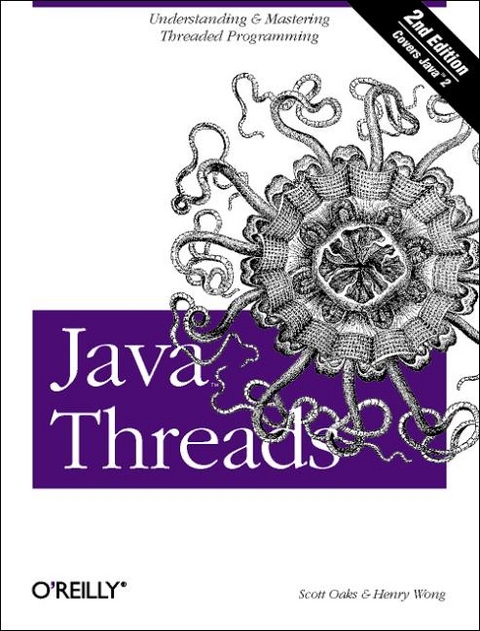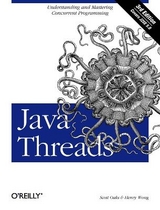
Java Threads
O'Reilly Media (Verlag)
978-1-56592-418-5 (ISBN)
- Titel erscheint in neuer Auflage
- Artikel merken
Threads aren't a new idea: many operating systems and languages support them. But despite widespread support, threads tend to be something that everyone talks about, but few use. Programming with threads has a reputation for being tricky and nonportable. However, Java's thread facilities are easy to use and completely portable between platforms. Revised to cover Java 1.2, this text focuses on Java's thread facilities, showing: where to use threads to increase efficiency, how to use them effectively, and how to avoid common mistakes. It covers the Thread and ThreadGroup classes, the Runnable interface, and the language's synchronized operator. It explains thread scheduling ends by developing a CPUSchedule class, showing how to implement a scheduling policy. Extended examples include classes that implement reader/writer locks, general locks, locks at arbitrary scope, and asynchronous I/O.
Scott Oaks is a Java technologist at Sun Microsystems, where he has worked since 1987. While at Sun, he has specialized in many disparate technologies, from the SunOS kernel to network programming and RPCs to the X Window System to threading. Since early 1995, he has been primarily focused on Java and bringing Java technology to end users; he is also the author of Java Security from O'Reilly. Around the Internet, Scott is best known as the author of olvwm, the OPEN LOOK window manager. Scott holds a bachelor of science in mathematics and computer science from the University of Denver and a master of science in computer science from Brown Univeristy. Prior to joining Sun, he worked in the research division of Bear, Sterns. In his other life, Scott enjoys music (he plays flute and piccolo with community groups in New York), cooking, theatre, and traveling with his husband James. Henry Wong is a tactical engineer at Sun Microsystems, where he has worked since 1989. Originally hired as a consultant to help customers with special device drivers, kernel modifications, and DOS interoperability products, Henry has also worked on Solaris ports, performance tuning projects, and multithreaded design and implementations for benchmarks and demos. Since early 1995, Henry has been involved in developing Java prototypes and supporting customers who are using Java. Prior to joining Sun, Henry earned a bachelor of science degree in chemical engineering from The Cooper Union in 1987. He joined a small software company in 1986 working on SCSI device drivers, image and audio data compression, and graphics tools used for a medical information system. When not in front of a computer, Henry is an instrument rated private pilot, who also likes to dabble in archery, cooking, and traveling to different places with his wife, Nini.
Preface. 1. Introduction to Threading Java Terms Thread Overview Why Threads? Summary. 2. The Java Threading API Threading Using the Thread Class Threading Using the Runnable Interface The Life Cycle of a Thread Thread Naming Thread Access More on Starting, Stopping, and Joining Summary. 3. Synchronization Techniques A Banking Example Reading Data Asynchronously A Class to Perform Synchronization The Synchronized Block Nested Locks Deadlock Return to the Banking Example Synchronizing Static Methods Summary. 4. Wait and Notify Back to Work (at the Bank) Wait and Notify wait(), notify(), and notifyAll() wait() and sleep() Thread Interruption Static Methods (Synchronization Details) Summary. 5. Useful Examples of Java Thread Programming Data Structures and Containers Simple Synchronization Examples A Network Server Class The AsyncInputStream Class Using TCPServer with AsyncInputStreams Summary. 6. Java Thread Scheduling An Overview of Thread Scheduling When Scheduling Is Important Scheduling with Thread Priorities Popular Scheduling Implementations Native Scheduling Support Other Thread-Scheduling Methods Summary. 7. Java Thread Scheduling Examples Thread Pools Round-Robin Scheduling Job Scheduling Summary. 8. Advanced Synchronization Topics Synchronization Terms Preventing Deadlock Lock Starvation Thread-Unsafe Classes Summary. 9. Parallelizing for Multiprocessor Machines Parallelizing a Single-Threaded Program Inner-Loop Threading Loop Printing Multiprocessor Scaling Summary. 10. Thread Groups Thread Group Concepts Creating Thread Groups Thread Group Methods Manipulating Thread Groups Thread Groups, Threads, and Security Summary. A. Miscellaneous Topics B. Exceptions and Errors
| Erscheint lt. Verlag | 23.2.1999 |
|---|---|
| Zusatzinfo | Ill. |
| Verlagsort | Sebastopol |
| Sprache | englisch |
| Maße | 178 x 233 mm |
| Gewicht | 550 g |
| Einbandart | kartoniert |
| Themenwelt | Informatik ► Programmiersprachen / -werkzeuge ► Java |
| Mathematik / Informatik ► Informatik ► Web / Internet | |
| ISBN-10 | 1-56592-418-5 / 1565924185 |
| ISBN-13 | 978-1-56592-418-5 / 9781565924185 |
| Zustand | Neuware |
| Haben Sie eine Frage zum Produkt? |
aus dem Bereich



